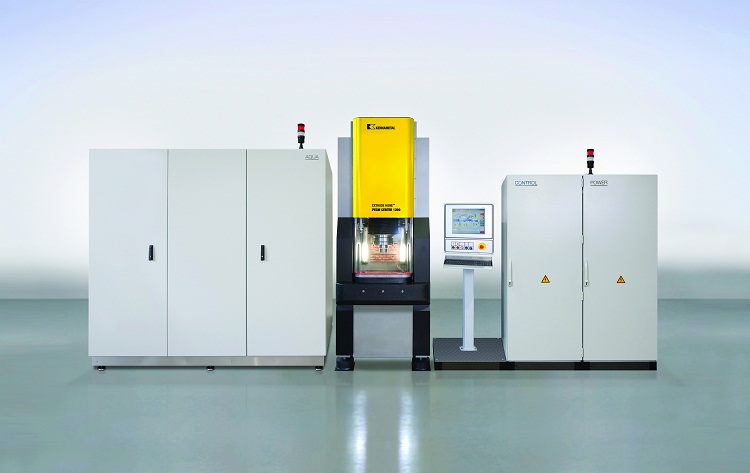Electrochemical Machining (PECM) From Kennametal Precision Surface Solutions® redefines machining capabilities
Precision Electrochemical Machining (PECM) is a non-conventional machining process that can really help deliver high-quality components productively. Kennametal Precision Surface Solutions Product Manager Patrick Matt explain more about the process:
What is PECM?
Precision electrochemical machining (PECM) is an electrochemical cavity-sinking erosion process with oscillating electrodes and a regulated working gap. It applies a pulsed direct current between the electrode and the workpiece. The workpiece dissolves anodically in accordance with the geometry of the subsequent electrode. This gives rise to complex geometrical shapes in practically all electrically conductive metals, e.g. in highly-tempered steel, rolling bearing steel, powder-metallurgy steel and super-alloys. PECM thereby also taps applications which could not be manufactured feasibly or at all in the past.
Shaping, drilling, or micro structuring on external or internal areas are typical applications PECM can achieve efficiently. Regarding tolerances, the process is able of achieving quality in a 2 to 5µm range. Roughing, finishing, and polishing are typically combined into one operation. Achievable surface finish is 0,05μm. Feed rate of cathode between 0,1mm/min – 2 mm / min (application related).Typically multiple parts are machined within one cycle to achieve an attractive cost per part.
What is the background with this technology?
Historically speaking, PECM technology first emerged in the 1990’s, exclusively associated with adding fine details to razor blade manufacturing. Machines appeared on the market in 2006, and for the past three years, Kennametal Precision Surface Solutions and PEMTEC became partners to provide PECM Centers to global regions, including China.
What does Kennametal Precision Surface Solutions offer regarding PECM technology?
Depending of the region, Kennametal Precision Surface Soluitons offers customers equipment (machine and specific tooling and post conditioning systems). Additionally we offer process development support and subcontract activity to support either testing, ramp up of production, and simple contract activities.
What are the key features that drive the adoption of PECM?
-Lower cost / part
- Short cycle times due to multiple machined within one cycle (typically 4 – 60 pcs. / cycle )
- Almost no electrode wear – therefore very attractive running costs
- Independent from material hardness
- Reduction of process steps – (Shaping, surface finishing ( up to 0,05 μm ) & deburring into one operation)
– Freedom of design
- Once negative shape is created into the electrode – each part formed looks like the other.
- Almost all shapes & features are able to machine economically by PECM which aren’t by conventional machining
-Part performance
- Parts free from any tension as neither mechanical nor thermal stress load will be applied to the part => part performance, fatigue strength of part increases
- Surface generated free from any structure
What are the benefits of using PECM versus conventional machining processes?
- Reduction in process steps, PECM creates finished features like shapes, holes free from burrs in a single step.
- Superior surface finish up to 0,05μm beside 2- 5 μm tolerance.
- Parts free from any oxide layers & free from any tension.
- As the electrode does not touch the part, the process does not care about material properties (hard , soft, rigid etc.) and accordingly offers capabilities unreached by other processes.
- The running cost are very attractive
- Attractive cycle times: multiple parts machined within one cycle.
What is the key production criterion and limits to leverage a successful PECM adoption?
- Intricate shape and thickness of the component favor PECM
- High production rate and huge volume production contributes heavily
- Scope of dimension as a max surface to be machined at once has to be within a 100cm² areas.
What is the potential of PECM technology in the market?
PECM has the ability to become more than a niche technology, as it delivers precise products with almost no post-processing effort (deburring, finishing) independent from material hardness, which is the base for lower-cost part production compared to traditional machining.
There is obviously a market demand for such technology for hard-to-machine materials as well as cost pressures forcing the market to nurture innovations. As most of the markets look for higher efficiency, we will see more and more engineered parts coming up (higher stress loaded, smaller, more precise, exotic material hard to machine, etc.). To produce these parts, PECM could become a key process as it ensures the economic competitiveness of their users on the global market.
Kennametal Precision Surface Solutions can provide more information from our Precision Surfaces Solutions PECM Center of Excellence by contacting k-hlzg.information@kennametal.com


